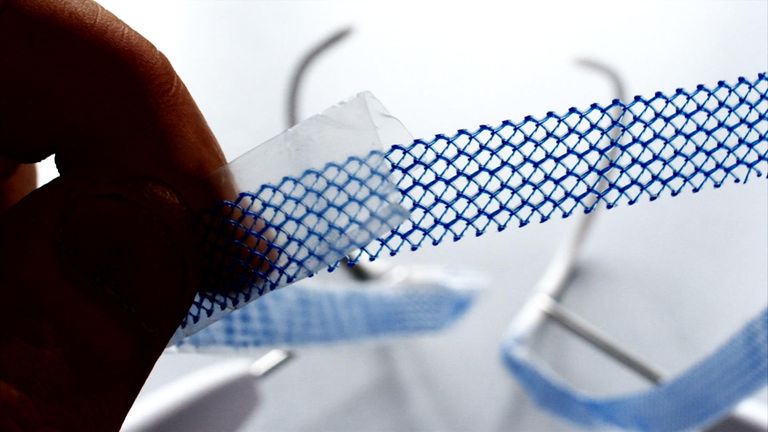By Charlotte Lomas, news correspondent
Testing on the plastic material used in vaginal mesh implants "is way less than you would see on a vacuum cleaner or a washing machine", a world expert has told Sky News.
The use of vaginal mesh to treat incontinence is currently suspended in the UK, pending the results of an independent safety review after thousands of women reported devastating complications.
Chartered chemist Dr Chris DeArmitt has been arguing the material used in the mesh is not safe and his expertise has been called upon during court action against vaginal mesh manufacturers.
His testimony that the polypropylene plastic should not be used inside the body has helped 9,000 women settle out of court.
Dr DeArmitt, who is a consultant to the top technology firms in America, told Sky News: "I see an absolute disregard for proper testing. Testing is way less than you would see on a vacuum cleaner or a washing machine. It's shocking. I've never seen anything like it in my career."
Advertisement
He believes the material is rejected by the body and the mesh degrades once inside the person, although manufacturers say the material is safe.
He said: "There are two main reasons why any plastics material expert will tell you just obviously that this is a bad material and I have never heard anyone who disagrees with me.
More from Vaginal Mesh

"Firstly, it's oxidatively unstable which means, like an apple, it's attacked by air so it's not going to last long enough in the body. That's knockout criteria right there because it's just going to fail, go brittle and fall into pieces.
"Secondly, it's not bio-compatible. So when it is put into the body, all of your body tries to react. It's like having a splinter, your body says 'hey there's a foreign body in here let's get this out' and it fights this using different mechanisms, which leads to inflammation and pain."
Polypropylene mesh has been commonly used to treat incontinence and prolapse in women for decades and is used in hernia repair.
While the surgery can be successful, it can also cause life-changing complications including chronic pain. People will react differently to mesh as no immune system is the same and there is a notable lack of long-term studies looking into the problem.
In February 2018, the government announced an independent review into vaginal mesh implants and in July that year the surgery was suspended and a high vigilance period imposed. This development came after the chair of the review, Baroness Cumberlege, had met patient groups and heard their personal accounts.
Dr Vincent Argent, a consultant gynaecologist, is one medical expert who has provided evidence to the Cumberlege review.
:: Vaginal mesh campaigner Chrissy Brajcic dies from sepsis after four-year battle
He said he warned the medical watchdog NICE about the risks of mesh when it was first introduced in the late 1990s but was ignored.
Dr Argent said: "If it was introduced now I don't think it would get a licence. The problem with mesh is the physio chemical changes that it undergoes, which happen over many years, as it has emerged now. This could have been predicted from studies way back in the 1960s and 70s which showed that polypropylene is inherently unstable.
"My opinion is it shouldn't be used in routine clinical practice untiRead More – Source
[contf]
[contfnew]

Sky News
[contfnewc]
[contfnewc]





